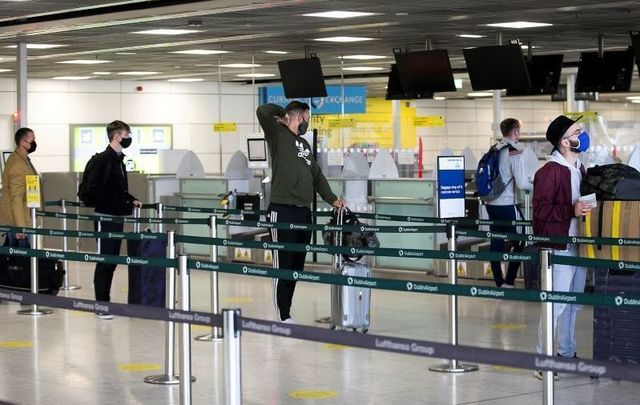Different countries have different travel restrictions in place in hopes of curbing the spread of coronavirus.
Update November 20, 2020: Ireland has recently adopted the EU 'Traffic Lights Approach to Travel,' which see the United States and other non-member states categorized as 'red.' Effective November 29, travelers arriving in Ireland from orange, red, or grey countries can conclude their 14-day period of restricted movements if they produce a negative PCR coronavirus test taken five days after arrival in Ireland. You can read more here.
Update September 10, 2020: The CDC has announced that the US will no longer be funneling international arrivals through selected US airports as enhanced entry health screenings will cease from September 14. You can read more here.
Update August 8, 2020: The US State Department has downgraded its travel advisory for the Republic of Ireland. For updated information, read here.
Editor's Note: While travel between Ireland and the US may be technically permitted for some travelers, we echo the official advice that international travel, for the time being, should be reserved for essential reasons only.
Coronavirus has caused massive disruptions to travel the world over as countries are fighting to mitigate the spread of the often deadly virus.
Read More: Ireland not subject to EU's recommendation on lifting travel restrictions
Unlike many other countries in Europe, the Republic of Ireland never opted to close its borders to international travelers, but they have placed self-isolation requirements in place for those arriving from abroad.
The official travel advice from Ireland’s Department of Foreign Affairs as of July 7 says: “Avoid non-essential travel until further notice: The Irish Authorities advise against all non-essential travel overseas until further notice. This includes Great Britain but does not apply to Northern Ireland. It also includes all travel by cruise ship.”
Read More: Ireland, UK added to US coronavirus travel ban
The United States, on the other hand, issued a sweeping ban on entry from non-residents, including Ireland, in March which remains in effect today until further notice.
The Centers for Disease Control and Protection (CDC) in the US "recommends that travelers avoid all nonessential international travel. The Department of State advises U.S. citizens to avoid all international travel due to the global impact of COVID-19. In countries where commercial travel options remain available, U.S. citizens should arrange for immediate return to the United States, unless they are prepared to remain abroad for an indefinite length of time."
Can I travel to the Republic of Ireland from the United States?
Update November 20, 2020: Ireland has recently adopted the EU 'Traffic Lights Approach to Travel,' which see the United States and other non-member states categorized as 'red.' Effective November 29, travelers arriving in Ireland from orange, red, or grey countries can conclude their 14-day period of restricted movements if they produce a negative PCR coronavirus test taken five days after arrival in Ireland. You can read more here.
Update August 8, 2020: The US State Department has downgraded its travel advisory for the Republic of Ireland. For updated information, read here.
Yes, but you are required to complete a Passenger Locator Form and you will be made to self-isolate for 14 days upon arrival. These restrictions apply to all travelers, including Irish citizens returning to Ireland.
It is a legal requirement in Ireland to complete a Passenger Locator Form upon arrival, except for the following types of travelers:
- Passengers arriving from Northern Ireland.
- Passengers leaving the State from their port or airport of arrival without otherwise exiting the port or airport.
- Holders of a Certificate for International Transport Workers, or drivers of a heavy goods vehicle, who are in the State in the course of performing their duties.
- Aircraft crew, including the pilot, who are in the State in the course of performing their duties
- Ship crew, including the maritime master, who are in the State in the course of performing their duties.
- Foreign diplomats.
Self-isolation means staying indoors and completely avoiding contact with other people. You can travel to where you plan to self-isolate, but avoid using public transport if possible - ask a relative or household member to collect you when you arrive in Ireland. Household members who were not traveling with you do not need to self-isolate or restrict their movements. You may be contacted during the 14 days after you arrive in Ireland to check that you are self-isolating.
How to self-isolate upon arrival in Ireland:
- Stay at home, in a room with a window you can open.
- Keep away from others in your home as much as you can. Use a separate toilet if possible.
- Check your symptoms - call a doctor if they get worse. Phone your doctor if you need to - do not visit them.
- Cover your coughs and sneezes using a tissue - clean your hands properly afterward.
- Wash your hands properly and often.
- Use your own towel - do not share a towel with others.
- Clean your room every day with a household cleaner or disinfectant.
- Do not go outside unless you have your own outdoor space where you can get some fresh air
- Do not go outside unless you have your own outdoor space where you can get some fresh air.
- Do not go to work, school, religious services or public areas.
- Do not share your things. For example, food, dishes, drinking glasses or other household items.
- Do not use public transport or taxis.
- Do not invite visitors to your home.
The only people who do not need to self-isolate upon arrival into Ireland are people who are:
- arriving in the State from Northern Ireland
- aircraft crew, including pilots, in Ireland as part of their work duties
- holders of a Certificate for International Transport Workers, or drivers of a heavy goods vehicle, who are in Ireland for this work
- ship crew, including the maritime master, in the course of performing their duties
Per the US Embassy in Ireland on July 6: “Travelers should be prepared for travel restrictions to be put into effect with little or no advance notice.
“There are no restrictions on flights from the United States to Ireland although the number of available flights is significantly diminished. Aer Lingus is the only carrier flying to the United States from Ireland, with limited service from Dublin to Boston, Chicago, and New York. Health Service Executive (HSE) staff are present at the Dublin and Shannon airports to assist arriving passengers who have concerns related to COVID-19.
“If you are in Ireland and have symptoms, phone a doctor or dial 112 or 999 locally. If someone tests positive for the virus, the Department of Health (DOH) will isolate and treat the individual.”
Ireland’s Department of Foreign Affairs has launched an advice centre for coronavirus-related travel queries. Phone 01 613 1733 or contact them via webchat.
Can I travel to the United States from the Republic of Ireland?
Update September 10, 2020: The CDC has announced that the US will no longer be funneling international arrivals through selected US airports as enhanced entry health screenings will cease from September 14. You can read more here.
Yes, but only if you are a US citizen or legal resident, or fall into one of the exemption categories. All travelers arriving into the US will be funneled through one of 13 designated airports. Anyone arriving into the US from abroad is urged by the CDC to self-isolate for 14 days.
In his proclamation issued on March 14, US President Donald Trump wrote:
“The Republic of Ireland has an open border with the United Kingdom in that persons can generally move freely between the Republic of Ireland and the United Kingdom — by land to and from Northern Ireland and by ferry or aircraft to and from Wales, England, and Scotland. This general ability to travel freely between the United Kingdom and the Republic of Ireland poses the same challenges that the Schengen Area posed for suspending and limiting entry to the United States by travelers who had been physically present within any of the Schengen Area countries. CDC has also determined that the Republic of Ireland is experiencing ongoing sustained person-to-person transmission of SARS-CoV-2. As of March 13, 2020, the World Health Organization reported that the Republic of Ireland had 70 cases of COVID-19, 5 times more cases than there were 7 days prior.
“The United States Government is unable to effectively evaluate and monitor all of the travelers continuing to arrive from the United Kingdom and the Republic of Ireland. The potential for undetected transmission of the virus by infected individuals seeking to enter the United States from the United Kingdom and the Republic of Ireland threatens the security of our transportation system and infrastructure and the national security. Given the importance of protecting persons within the United States from the threat of this harmful communicable disease, I have determined that it is in the interests of the United States to take action to restrict and suspend the entry into the United States, as immigrants or nonimmigrants, of all aliens who were physically present within the United Kingdom, excluding overseas territories outside of Europe, or the Republic of Ireland during the 14-day period preceding their entry or attempted entry into the United States. The free flow of commerce between the United States and the United Kingdom and the Republic of Ireland remains an economic priority for the United States, and I remain committed to facilitating trade between our nations.”
American citizens, legal permanent residents, and their immediate families who are arriving from impacted areas, including Ireland, must travel through one of the following 13 airports where the Department of Homeland Security (DHS) has established enhanced entry screening capabilities:
- Boston-Logan International Airport (BOS), Massachusetts
- Chicago O’Hare International Airport (ORD), Illinois
- Dallas/Fort Worth International Airport (DFW), Texas
- Detroit Metropolitan Airport (DTW), Michigan
- Daniel K. Inouye International Airport (HNL), Hawaii
- Hartsfield-Jackson Atlanta International Airport (ATL), Georgia
- John F. Kennedy International Airport (JFK), New York
- Los Angeles International Airport, (LAX), California
- Miami International Airport (MIA), Florida
- Newark Liberty International Airport (EWR), New Jersey
- San Francisco International Airport (SFO), California
- Seattle-Tacoma International Airport (SEA), Washington
- Washington-Dulles International Airport (IAD), Virginia
Per the Department of Homeland Security (DHS), “Upon arrival, travelers will proceed to standard customs processing. They will then continue to enhanced entry screening where the passenger will be asked about their medical history, current condition, and asked for contact information for local health authorities. Passengers will then be given written guidance about COVID-19 and directed to proceed to their final destination, and immediately home-quarantine in accordance with CDC best practices."
The following are the exemptions to the current ban on travelers entering the United States:
- any lawful permanent resident of the United States;
- any alien who is the spouse of a U.S. citizen or lawful permanent resident;
- any alien who is the parent or legal guardian of a U.S. citizen or lawful permanent resident, provided that the U.S. citizen or lawful permanent resident is unmarried and under the age of 21;
- any alien who is the sibling of a U.S. citizen or lawful permanent resident, provided that both are unmarried and under the age of 21;
- any alien who is the child, foster child, or ward of a U.S. citizen or lawful permanent resident, or who is a prospective adoptee seeking to enter the United States pursuant to the IR-4 or IH-4 visa classifications;
- any alien traveling at the invitation of the United States Government for a purpose related to containment or mitigation of the virus;
- any alien traveling as a nonimmigrant pursuant to a C-1, D, or C-1/D nonimmigrant visa as a crewmember or any alien otherwise traveling to the United States as air or sea crew;
- any alien seeking entry into or transiting the United States pursuant to one of the following visas: A-1, A-2, C-2, C-3 (as a foreign government official or immediate family member of an official), E-1 (as an employee of TECRO or TECO or the employee’s immediate family members), G-1, G-2, G-3, G-4, NATO-1 through NATO-4, or NATO-6 (or seeking to enter as a nonimmigrant in one of those NATO categories); or
- any alien whose travel falls within the scope of section 11 of the United Nations Headquarters Agreement;
- any alien whose entry would not pose a significant risk of introducing, transmitting, or spreading the virus, as determined by the Secretary of Health and Human Services, through the CDC Director or his designee;
- any alien whose entry would further important United States law enforcement objectives, as determined by the Secretary of State, the Secretary of Homeland Security, or their respective designees, based on a recommendation of the Attorney General or his designee;
- any alien whose entry would be in the national interest, as determined by the Secretary of State, the Secretary of Homeland Security, or their designees; or
- members of the U.S. Armed Forces and spouses and children of members of the U.S. Armed Forces.
- Nothing in this proclamation shall be construed to affect any individual’s eligibility for asylum, withholding of removal, or protection under the regulations issued pursuant to the legislation implementing the Convention Against Torture and Other Cruel, Inhuman or Degrading Treatment or Punishment, consistent with the laws and regulations of the United States.
For further information about travel to the United States from Ireland, view the Irish Embassy's website here. For more information about international arrivals into the US, view the CDC's advice page here.




Comments